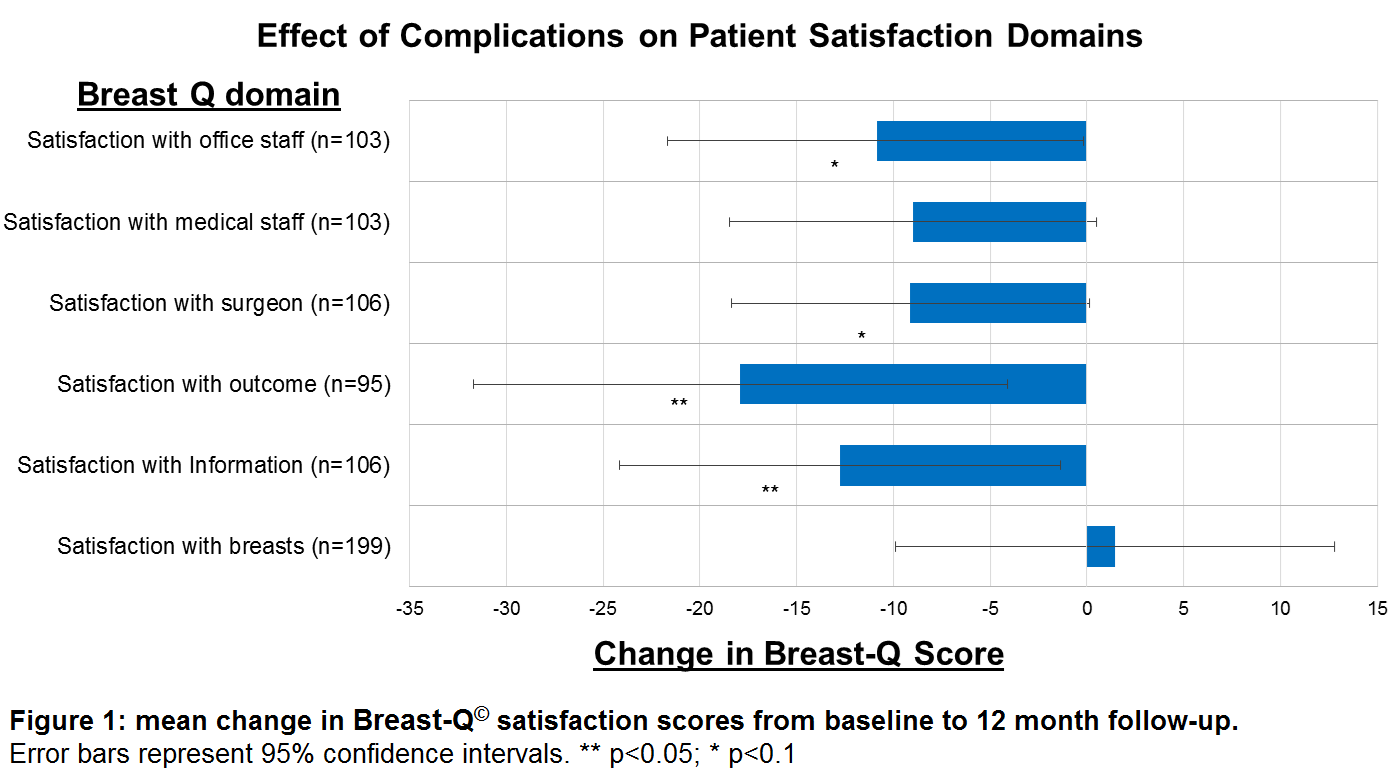|
|
|
|
|
Back to 2016 Annual Meeting
Effect of Post-Operative Complications on Patient Satisfaction: Results from a Cohort of 200 Breast Reconstruction Patients using Breast-Q© and RAND-36
Ricardo J. Bello, MD, MPH, Melanie R. Major, BS, Chris Devulapalli, MD, Anil Kashyap, MD, DDS, Eric L. Wan, BS, Justin D. Sacks, MD, Michele A. Manahan, MD, Carisa M. Cooney, MPH, Gedge D. Rosson, MD.
Johns Hopkins University, Baltimore, MD, USA.
Purpose: Despite advances in surgical techniques and quality improvement, considerable numbers of breast reconstruction patients still experience post-operative complications. Postoperative complications have been associated with lower patient satisfaction and quality-of-life in colorectal surgery, esophageal surgery, and cardiac surgery. To our knowledge, however, this association has not been demonstrated in breast reconstruction surgery using validated patient-reported outcomes. This study investigated the effect of post-operative complications on breast-specific and general patient satisfaction and quality-of-life in patients who underwent breast reconstruction.
Methods: We analyzed prospectively-collected patient-reported outcome measures on patient satisfaction and quality-of-life on all patients undergoing breast reconstruction at our institution between November 2010 and June 2013. Breast-Q© and RAND-36 scores were available preoperatively, after tissue expander placement, and 6 and 12 months after final reconstruction. We selected the following Breast-Q© domains: Satisfaction with Breasts, Satisfaction with Outcome, Satisfaction with Information, Satisfaction with Surgeon, Satisfaction with Medical Staff, and Satisfaction with Office Staff. We calculated Mental Health Summary Score and Physical Health Summary Score from RAND-36. We used t-test, Wilcoxon rank-sum test, and multiple linear regression to assess the effect of post-operative complications on patient satisfaction and quality-of-life.
Results: Of 200 patients completing long-term follow-up, 32 (16%) experienced post-operative complications. Patients with complications had significantly decreased Breast-Q© scores for Satisfaction with Information (12.74 points; 95% CI: 1.34-24.14; p=0.029) even after adjusting for confounding (15.27 points; 95% CI: 3.32-27.23; p=0.013). Patient Satisfaction with Outcome was also significantly decreased (17.90 points; 95% CI: 4.12-31.68; p=0.012) even after adjusting for confounding (20.39 points; 95% CI: 6.10-34.67; p=0.006). We found suggestive evidence for a decrease in Satisfaction with Surgeon (9.13 points; 95% CI: -0.11-18.38; p=0.053), which became significant after adjusting for confounding (10.87 points; 95% CI: 0.68-21.05; p=0.037). These differences were larger than the reported minimal clinically-important difference for the Breast-Q© (6-10 points). We also found suggestive evidence for a decrease in Satisfaction with Office Staff (10.84 points; 95% CI: -0.01-21.50; p=0.050), which became nonsignificant after adjusting for confounding (p=0.146). We did not find any evidence for a difference in Satisfaction with Breasts (p=0.799), RAND-36 Physical Health Summary Score (p=0.442) and RAND-36 Mental Health Summary Score (p=0.281), even after adjusting for confounding (p=0.329, p=0.339, and p=0.267, respectively).
Conclusions: These findings highlight the negative effects of post-operative complications on patient satisfaction, which go beyond well-characterized clinical outcomes and economic concerns. In particular, our results stress the importance of patient safety interventions and educating patients pre-operatively to mitigate lower satisfaction and quality-of-life scores. These findings are important in a healthcare environment in which many of the current reforms are based on patient centeredness and patient satisfaction. | | | | | | | Table 1: Differences in Breast-Q© and Rand-36 scores in patients presenting complications in breast reconstruction (presented as mean±SD) | | Domain/Scale | All | No complications | Complications | Differences (95% CI) | p-value | | Breast-Q© domains | | | | | | | Satisfaction with Breasts | 9.21±29.73 | 8.97±28.92 | 10.44±34.17 | -1.47 (-12.81 - 9.88) | 0.799 | | Satisfaction with Information | 2.92±20.40 | 4.60±19.52 | -8.14±23.34 | 12.74 (1.34 - 24.14) | 0.029 | | Satisfaction with Outcome | -0.08±22.28 | 1.99±19.54 | -15.91±34.45 | 17.90 (4.12 - 31.68) | 0.012 | | Satisfaction with Surgeon | -0.72±16.47 | 0.49±14.87 | -8.64±23.76 | 9.13 (-0.11 - 18.38) | 0.053 | | Satisfaction with Medical Staff | -2.47±16.80 | -1.24±13.55 | -10.21±29.97 | 8.98 (-0.49 - 18.45) | 0.242 | | Satisfaction with Office Staff | -1.7±19.13 | -0.26±17.40 | -11.0±26.84 | 10.84 (-0.01 - 21.50) | 0.050 | | Rand-36 scales | | | | | | | Physical Health summary score | 1.75 ± 19.19 | 2.24 ± 17.72 | -0.68 ± 25.56 | 2.91 (-4.54 to 10.37) | 0.442 | | Mental Health summary score | 5.33 ± 18.86 | 6.01 ± 17.93 | 1.99 ± 22.93 | 4.02 (-3.31 to 11.35) | 0.281 |

Back to 2016 Annual Meeting
|
|
